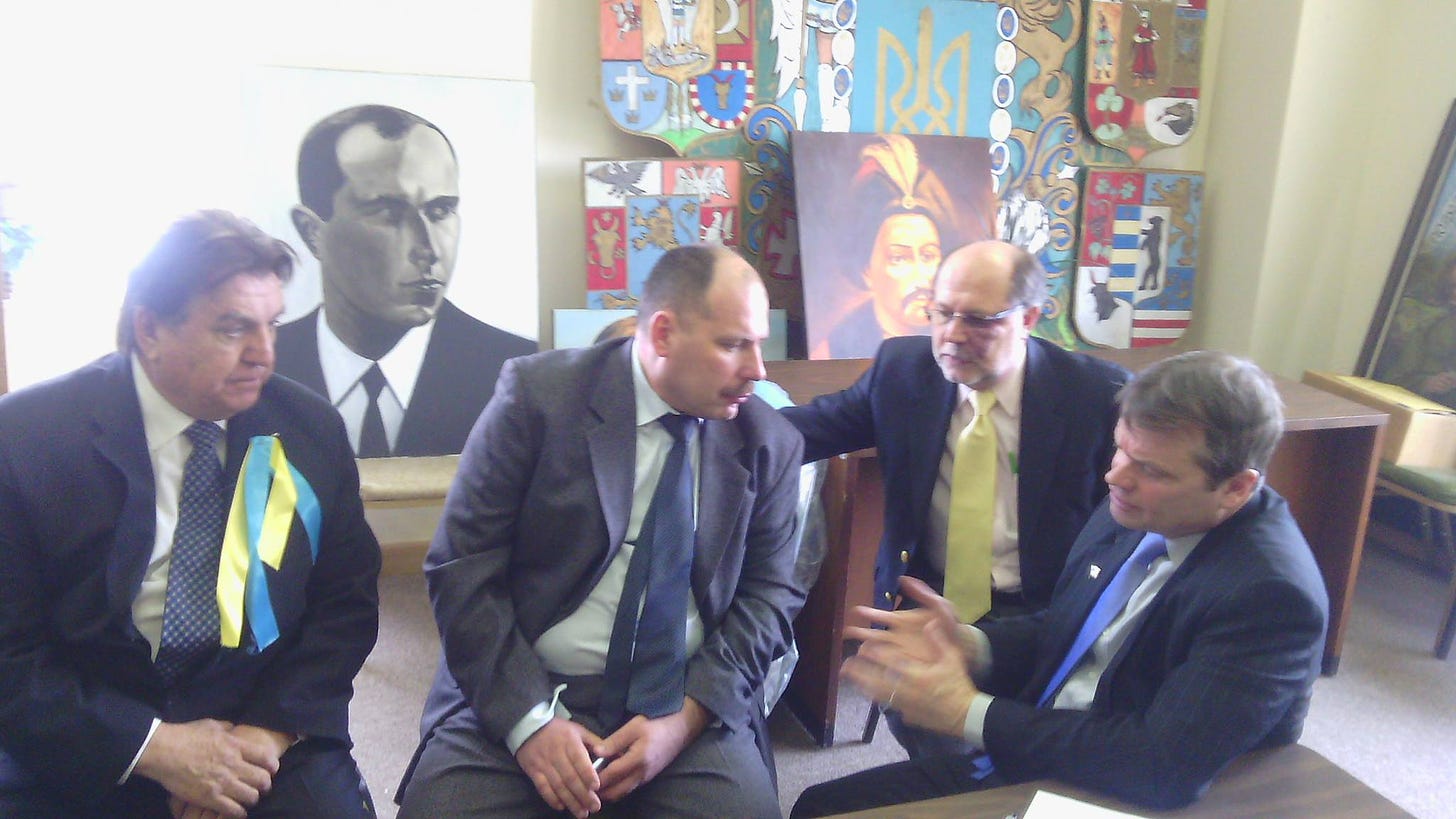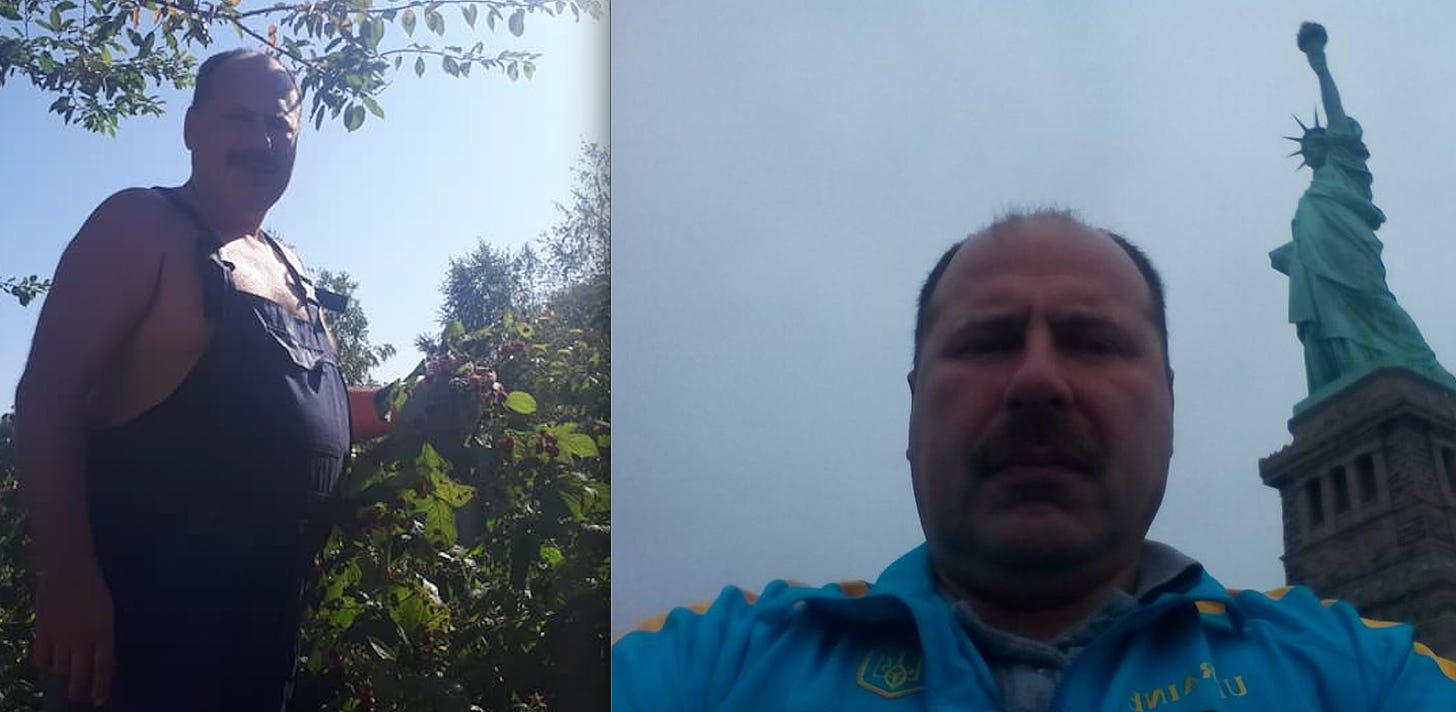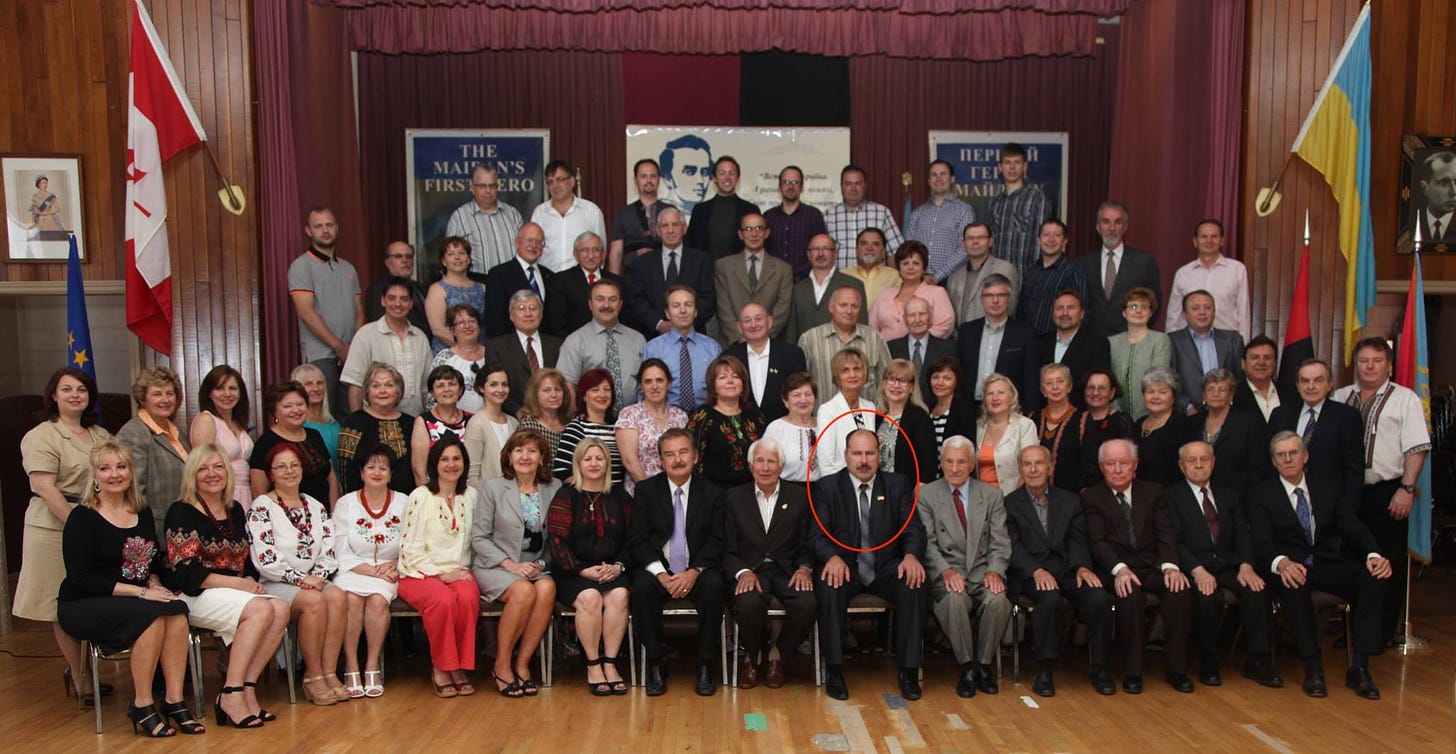New Sheriff in Town
OUN-B's first Leader from Ukraine in over 20 years
Earlier this month in Ukraine, the OUN-B held its 15th “Grand Assembly” and unanimously “elected” a new leadership of the internationally active Bandera Organization. The reign of Stefan Romaniw (b.1955) from Australia, which started in 2009, has ended after thirteen years. “Thank you for your work as head of our organizations,” said an elder Canadian member of the Ukrainian Youth Association.
Oleh Medunytsia (b.1971) isn’t a surprising successor, because he served as Romaniw’s deputy at least in 2013-18. Medunytsia, a former member of Ukrainian parliament (2012-19), is in some ways a historic choice. “It’s disgusting…” commented Iryna Farion, a controversial figure from the far-right Svoboda party, which has at least one or two OUN-B members in its upper echelon. Medunytsia hails from Sumy in northeastern Ukraine, rather than the western Nationalist homeland, and is the first Providnyk (“Leader”) to be born in the Soviet Union, putting him on track to be the first to live his entire life in Ukraine.
In the nineties, Oleh Medunytsia joined an OUN-B political party and taught geography, science, and physical education to Ukrainian youth in Sumy. Before that he founded the regional branch of the OUN-B affiliated Ukrainian Youth Association (Спілка Української Молоді, СУМ). In 1990, a nineteen year old Medunytsia participated in the so-called “Revolution on Granite,” a student protest movement that led to the resignation of the chairman of the Council of Ministers in Soviet Ukraine. The following year, when the country became independent, Medunytsia visited Toronto, which is how the future Providnyk first became acquainted with the leading Banderites in Canada. Medunytsia was “very impressed” with their “organized, patriotic, and dedicated Ukrainian community.”
Had Medunytsia been a fresh-off-the-boat Soviet immigrant introduced to CYM in the United States, second generation Banderite campers would have likely picked on him as a culturally backward “Ukie Dukie,” or a “schned.” Instead, Medunytsia co-founded the far-right Youth Nationalist Congress (MNK), a more hardcore OUN-B front in Ukraine, which he led in his thirties in the mid-2000s. Whereas Stefan Romaniw and his generation of OUN-B leaders from the diaspora were raised in CYM, Oleh Medunytsia is part of the first generation of MNK activists to rise through the ranks of the Bandera Organization.
In the 2000s, Medunytsia worked in the Sumy and Chernihiv Regional State Administrations. He joined Ukrainian parliament in 2012 with the declining pro-western oligarchic Fatherland party, rather than the “social-nationalist” Svoboda party, which won an unprecedented 37 seats (or 8%) in the Verkhovna Rada. (Perhaps this explains why Iryna Farion considers Medunytsia’s rise to power “disgusting.”) Fatherland led the trio of opposition parties, including Svoboda, that assumed leadership of the “Euromaidan” protests in 2013-14. By early 2014, Medunytsia became the deputy head of OUN-B, and a deputy commander of the “Maidan Self Defense” (MSD). Readers probably already know that Andriy Parubiy, a former neo-Nazi paramilitary leader and Fatherland parliamentarian, led the MSD.
On January 25, 2014, Ukrainian president Viktor Yanukovych met with the trio of opposition party leaders, and as part of his proposal to end the protests, offered the position of Prime Minister to Arseniy Yatsenyuk of Fatherland. Meanwhile, Oleh Medunytsia, “vice-commander of Euro-Maidan,” was in Chicago as a “special guest” of the annual “New Year’s Ball” held by the local branch of CYM. The following day, he spoke at a rally in Chicago and met with U.S. Representative Mike Quigley, a Democratic co-chair of the Congressional Ukraine Caucus.

By the end of January, the deputy OUN-B leader addressed Ukrainian American audiences in Buffalo, Watervliet, and Saratoga Springs in upstate New York. At the Ukrainian Home Dnipro in Buffalo, which belongs to the OUN-B affiliated Ukrainian American Freedom Foundation, Medunytsia said that “support services and expenses on the Maidan” had reached “about $80k a day.” In early February, Medunytsia visited Manhattan, Washington, and Detroit. The neoconservative American Foreign Policy Council invited Medunytsia to give a special briefing as a “member of the Euromaidan command center.” He was accompanied on this US tour by its chief organizer, Borys Potapenko, the secretary of the international coordinating body of OUN-B “facade structures.” (Seen above between Medunytsia and Quigley.)
Potapenko may have also arranged Medunytsia’s visit to Canada in June 2014. Oleh Medunytsia represented the OUN-B leadership at the triennial congress of the League of Ukrainian Canadians. He delivered the keynote speech, and sat front and center in the group photo. Medunytsia met at least a few Canadian politicians, including two Conservative leaders of the Canada-Ukraine Parliamentary Friendship Group, and one of its future Liberal chairmen. That year, perhaps following Andriy Parubiy’s lead, Medunytsia migrated to Prime Minister Yatsenyuk’s new political party (People’s Front) to keep a seat in Ukrainian parliament through 2019.
The last Bandera Lobby Blog post described how the MNK and OUN-B have utilized the amorphous “Free People network” over the past decade. In 2016, when Free People essentially became an MNK-led proto-party, Oleh Medunytsia made at least two trips to the United States. In October, he joined a Free People delegation to present their network to an audience of Banderites in New Jersey celebrating the 70th anniversary of the OUN-B affiliated Organization for Defense of Four Freedoms for Ukraine (ODFFU), which is the U.S. equivalent of the League of Ukrainian Canadians. A few years later, a feud erupted in the ODFFU, but Medunytsia has apparently remained neutral in that conflict.
A couple years later, as Free People organized the “Stop Revanche” campaign, which eventually morphed into the “Capitulation Resistance Movement,” Oleh Medunytsia co-founded the Ukrainian Strategic Initiative, which more or less became the think tank of the “Resistance Movement.” In June 2018, Medunytsia spoke at a conference in Washington organized by the Center for US-Ukrainian Relations (CUSUR), an important OUN-B front. He met at least two more members of Congress: Sander Levin (D-MI) and Peter Roskam (R-IL), neither of whom are still in office.
In late 2019, Oleh Medunytsia traveled to Argentina to promote the Capitulation Resistance Movement, as if reviving the role he played over five years earlier with his Euromaidan fundraising trip. Medunytsia met with members of the OUN-B affiliated Ukrainian Cultural Association in Buenos Aires. He also visited the impressive grave of an OUN assassin who made Stepan Bandera famous by gunning down the Interior Minister of Poland in 1934, and was later feared by Washington to be on a German mission to assassinate President Roosevelt in 1941. Oleh Medunytsia, wearing a CYM t-shirt, appears to have left flowers on the grave, and a banner “from the Leadership of OUN.” More recently, a couple weeks before the 15th Grand Assembly, Medunytsia mourned an “ideological fighter against imperialism” — a French mercenary and former recruiter for the Azov Battalion who allegedly died of alcoholism in Croatia.









Geen opmerkingen:
Een reactie posten